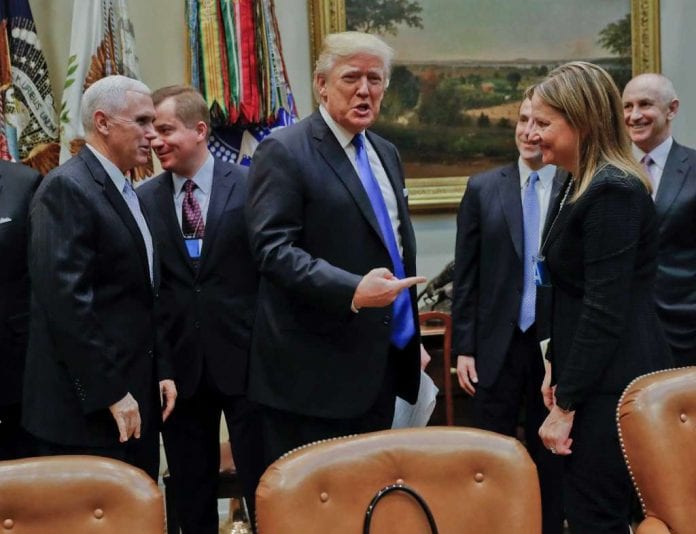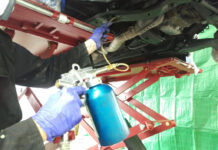According to the analysts, President Donald Trump is unaware of the consequences of taxing Mexican-made cars that would be sold in the US, and they indicate that a move such is this would throw the auto industry in disarray.
A business professor at the University of Michigan and a former vice president at General Motors Co. Marina Whitman said: ”I don’t think the auto industry would turn up its feet and die, but it would be a terrible shock. It would create mayhem with their profitability.”
Trump will meet with the heads of GM, Ford Motor Co., and FCA, as he confirmed that he would impose a “substantial border tax” on those car companies that move their production outside the US. Moreover, for those who decide to stay, or return their manufacturing to the homeland, he promised tax benefits.
Mexico has always been a heaven for car companies because of the cheap workforce and according to Whitman, Detroit automakers, will not be able to produce small cars in the US and remain profitable. Just for comparison, a worker in the US can make $58 an hour whereas the one in Mexico earns just over $8.
The US government data shows that $50.5 billion in vehicles and $51 billion in auto parts crossed the border from Mexico into the United States in 2015. The Mexico’s auto sector has grown substantially in the last few years, and by 2025, Mexico’s vehicle production capacity will jump to 5.5 million vehicles, which is a 49% rise, as the LMC Automotive claims. In the same period, US capacity will increase to 14.2 million vehicles or by 13%. All of this can change with the introduction of a 35% tariff on cars made in Mexico but imported to the US and a “border tax” that would charge the companies imports.

Trump’s new politics would definitely affect all of the carmakers that plan to sell in the US. For example, we have Audi that has just opened a new plant in Mexico, which they had decided to build five years ago. Laurie Harbour-Felax, a manufacturing consultant and president of Harbour Results Inc. said: “It’s very difficult to turn on your heels quickly in the auto industry.”
Volkswagen, GM, BMW and Toyota underlined that they will not change their plans for production no matter what and they stressed the amount of money invested. BMW is only one example, and they want to continue with the construction of a plant in Mexico in which they will produce 3 Series sedan from 2019. BMW owns the largest plant worldwide in South Carolina in which they manufacture SUVs.
Ford decided to stop the construction of a $1.6 billion plant in Mexico where they were supposed to produce the compact Focus. Moreover, they will invest $700 million into an already existent Michigan facility in which new electric cars will be assembled. According to Ford, President Trump is not the reason why they decided to stop the construction of the Mexico plant and the real reason is declining sales of small cars.
Ford CEO Mark Fields admitted that Trump’s promise regarding the lower corporate taxes would definitely make doing business in the USA more attractive. Unlike other heads of automotive companies, Fields is not worried when it comes to tariffs. Fiat Chrysler CEO Sergio Marchionne said that they might shut down all of the facilities in Mexico if the taxes are too high. He said: “Those plants were designed, built and purposed at a time when NAFTA was alive and well. It’s one of the perils associated with the business that we run.”
According to Gary Hufbauer, a senior fellow at the nonpartisan Peterson Institute for International Economics, Trump will need a congressional approval in order to impose those tariffs in the first place. Even if he manages to do so, the automakers could still continue with the production in Mexico and instead of selling these cars in the US they could sell it elsewhere.
Mexico has free trade agreements that cover 45 countries in total, and some of those agreements include the EU, Japan, and South America. Just for the record, the agreements of the US cover 20 countries. Nissan is the largest manufacturer in Mexico with more than 823,000 vehicles made in 2015. Out of that number, 46% was sold in the US. Nissan CEO Carlos Ghosn said at the 2017 Detroit Motor Show: “All carmakers will adapt to the new rules if there are new rules.”









